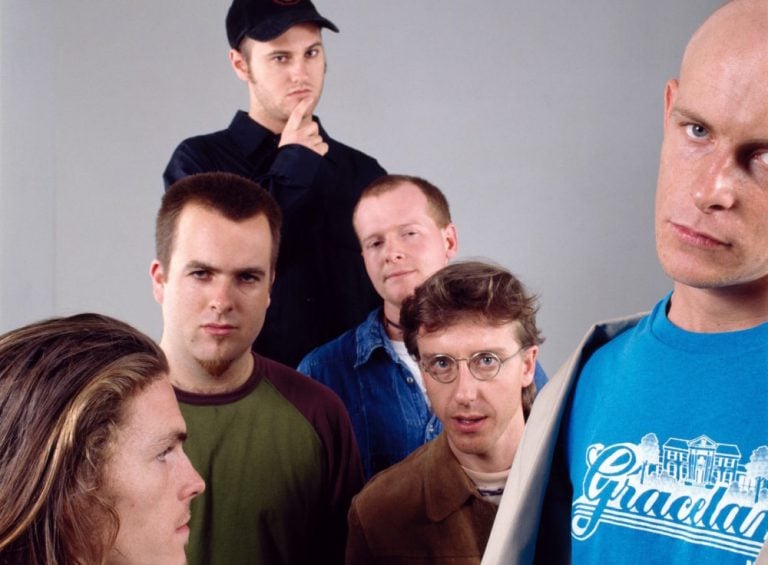Let’s be totally honest with ourselves: that whole ‘let’s get the band back together’ shtick doesn’t always work. No matter how much punters might miss all those beloved bands that call it quits, their eventual returns so often feel like little more than lazy cash grabs – lacklustre tours and rushed albums designed to scoop up easy armfuls of nostalgia bucks.
Consider Skunkhour the exception to the rule. Although the Australian funk rock legends officially broke up in 2001, burnt out after a full decade of making music, their recent comeback shows have seen them working at the very top of their game, playing with more vigour, intelligence and warmth than ever before. Skunkhour aren’t a band that have simply gotten back together because their collective coffers were running low – the energetic five-piece, famous for their blend of alt-rock tropes and acid jazz formlessness, have got back together because they couldn’t bloody keep away.
“The [2016 comeback] show went ballistic,” says the band’s vocalist-cum-rapper Del Larkin. “For me it was in the top three shows we’ve ever done. The whole place was singing along and getting their groove on, right up to the back of the Metro. We couldn’t wait to do it again. We just had to give it some space between the two [comeback] shows, otherwise they might lose their niche.”
For their upcoming reunion tour, Skunkhour will be playing their beloved hit record Feed in full, rewarding dedicated fans with a track-by-track walkthrough of that Australian classic. “Feed was our biggest album and went gold. It’s the album that helped us cross over into the triple j indie rock scene. I have a feeling this [tour] will be fully hectic too.”
Of course, the comprehensive nature of the tour has forced the band to repeatedly revisit the 22-year-old Feed itself, an experience that hasn’t always been exactly pleasant. There aren’t many of us who would be entirely comfortable with digging up something so personal buried so deeply in our past – it’d be like poring over that diary you kept when you were a teenager.
“There’s about four songs off of Feed that we have not played in a very, very long time,” Larkin says. “Songs like ‘Part Of The Solution’ and ‘Stay Close’. That makes the show quite scary. But it’s [also] exciting at the same time. Actually, I think that’s the best part of this gig for us and the fans. We are both in for some new treats.
“Most people we know who used to watch us back in the day and have come to any recent shows have told us that they think we are a better band these days. We used to play most of our stuff far too fast and too loud. I think that happens when you play a lot of rock venues and maybe tour too much. Now we really made the effort to listen to the original recordings again and to make sure that we are true to the dynamics and feel of the original. That also makes the set more engaging for the crowd, because there’s more contrast and variety in the material.”
Of course, the band also had that other major difficulty to traverse: each other. Not that Skunkhour’s split back in 2001 was any more acrimonious than most – there have been a whole host of Australian bands whose fallings out have been significantly more messy – but there is always at least a degree of awkwardness involved when a group of musicians who actively decided to leave each other be for a while are forced back into each other’s company.
We used to play most of our stuff far too fast and too loud.
Yet as far as Larkin is concerned, the harmoniousness of Skunkhour’s post-reformation relationship can be attributed entirely to how easy they’re all now taking things. The pressure is off these days – they’re not writing or playing in order to score bigger, better record deals, nor to keep a roof over their head. They’ve done all that shit; paid all those dues. Instead, they’re playing the shows because they want to.
“It’s really difficult to have business that’s in the creative arts and that also relies on five people having to constantly tour, promote, strategize, rehearse, negotiate deals and keep it creative and fun,” says Larkin. “It’s like a five-way marriage. Now we all have jobs, partners and most of us have kids and all the responsibilities that come along with it. It’s fun now. There’s no pressure any more. It’s like ‘The Boys Are Back In Town’, baby. Yew!”
Of course, just as Skunkhour have changed, so too have their audiences. The years have affected the crowds who come to the shows just as much they have affected the band cranking out the songs. Most importantly, Larkin stresses, the audiences seem almost more appreciative; happier to be there; more chuffed to drink in every chord.
Oh, and they also don’t mosh as much – whether that’s because they’re so totally focused or because their bodies don’t quite let them in the same way is up to you. “I think if [people] are still coming to see us after all these years, then they know that we really pride ourselves on delivering a fuck-off live show,” Larkin says.
“There’s no moshing and stage-diving now, which I’m very pleased about as moshes tend to distract and divide the audience. [Now] every single person in the crowd is there for [a] purpose.”
Skunkhour play the Metro Theatre on Saturday May 27.

































